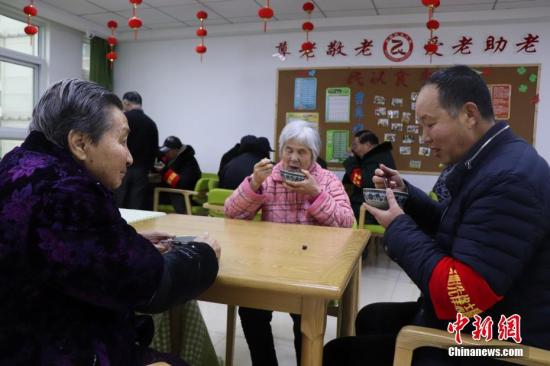(Observation of the Two Sessions) How can 130 million people achieve "rural pensions"? Three questions to be solved
China News Service, Beijing, March 9th, title: How do 130 million people realize "rural pensions"?
Three questions to be solved
Author Chai Jingbo Li Hanxue
The relative backwardness of the regional economy, the outflow of young and middle-aged population, and the relatively backward concept of old-age care, etc., many practical factors "block" the way to improve rural old-age care.
At the National People's Congress and CPPCC National People's Congress this year, many deputies of the National People's Congress and CPPCC members paid attention to the topic of "rural elderly care".
Data map: Villagers take meals in the "Parents Canteen" in Dongxin Village, Long'an County, Guangxi.
Photo by China News Agency reporter Chen Guanyan
The Central Committee of the Peasants and Workers Party pointed out in the "Proposal on Accelerating the Construction of the Rural Elderly Care Service System" that there are more than 250 million elderly people in China over 60 years old, and rural elderly people account for 130 million; the rural aging level reaches 22.5%, showing an "aging degree". "Deeper", "getting old before getting rich", "more difficult elderly", and "more urgent needs for elderly care"; it is predicted that by 2028, the proportion of rural elderly population in China will exceed 30%, which is 11% higher than that in cities.
Behind the four peculiarities and accelerating rising figures, there are three shortcomings in China's rural elderly care.
Insufficient supply of "integrated medical care and elderly care" for rural elderly care
"The reality of the rural elderly care is that there are many migrant workers, and often only the elderly and children are left behind; there are also a considerable number of subsistence households and destitute supporters." said Duan Qingying, member of the National Committee of the Chinese People’s Political Consultative Conference and chairman of the Shandong Provincial Committee of the Peasants and Workers Party. Nursing homes and happiness homes have been built, but the coverage rate still has room for improvement.
In addition to infrastructure, Wang Xiaomei, a representative of the National People's Congress and vice principal of Qingshen Middle School in Meishan City, Sichuan Province, found in a survey that the rural elderly care service system has insufficient supply of medical and elderly care services, different levels of institutions, incomplete services, and low occupancy rates. .
Data map.
Photo by Yu Xiujuan issued by China News Agency
Wu Hao, a member of the National Committee of the Chinese People's Political Consultative Conference and director of the Fangzhuang Community Health Service Center in Fengtai District, Beijing, told a reporter from China News Agency that the problem of elderly care cannot only rely on medical care, but the focus is still on "raising."
He believes that prioritizing the development of the "integrated medical care" model, many initiatives such as signing of family doctors, medical lectures, and publicizing free clinics in the community should also be "high hopes."
Insufficient “talent reserve” for the elderly in rural areas
Member of the National Committee of the Chinese People's Political Consultative Conference and director of the Department of Geriatrics of Henan Provincial People's Hospital, Huang Gairong, found that there is a lack of "mainstay" or the key to the problem of rural elderly care.
Huang Gairong believes that the current rural elderly care system lacks a "leader" for overall planning, and rural cadres must play a leading role in connecting with families, clinics, and outpatient hospitals.
She also said frankly that due to the limited difficulty of operation and the low income of nursing work, there is indeed a shortage of nursing staff in reality.
She suggested that the government introduce a series of incentive policies to encourage the "old age" and encourage the training of middle-aged and elderly people with working and learning abilities. While increasing the income of rural residents and nursing staff, it can alleviate the predicament of insufficient nursing staff.
She believes that rural revitalization depends on people, and we must consider whether we can use rural industries to retain talents, whether rural education and quality of life can be guaranteed in the future, and how to allocate and distribute rural pensions.
As mentioned in the 2021 government work report: make up for the shortcomings of rural school running conditions, improve the treatment of rural teachers; strengthen rural basic public services and public infrastructure construction; improve rural production and living conditions.
The weakening of the function of "family pension" in rural areas
The Central Committee of the Peasants and Workers Party pointed out that at present, the main body of responsibility for the elderly in China's rural areas is not clear, and the family's elderly care function is weakened.
Huang Gairong believes that the first person responsible for the elderly is always the family.
It is a fact that the problem of rural elderly care needs to be resolved urgently. In reality, some children do not visit or care about their parents in rural areas; they blindly want to entrust their parents to elderly care institutions; the phenomenon of unsound awareness of elderly care does exist.
The Central Committee of the Peasants and Workers Party proposes to consolidate the basic role of the family in rural elderly care, strengthen the main responsibility of family support, and create a good atmosphere of respect and filial piety for the elderly through the formulation of township regulations and the signing of child support service agreements.
For those who refuse to perform their maintenance obligations, the lead department shall be clearly held accountable.
(Finish)

